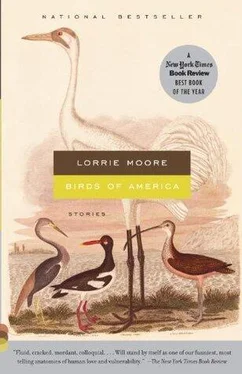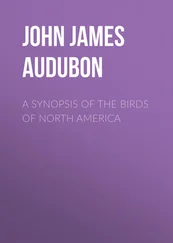“I can’t believe you’re jealous of your goddamn dog. Here,” Mack says. “I refuse to talk to someone with a milk mustache.” He hands Quilty a napkin, touching the folded edge of it to his cheek.
Quilty takes it and wipes his mouth. “Just when we were getting so good at being boring together,” he says. He reaches over and pats Mack’s arm, then reaches up and roughly pets his head. Mack’s hair is thin and swept back, and Quilty swipes at it from behind.
“Ow,” says Mack.
“I keep forgetting your hair is so Irish and sensitive,” he said. “We’ve gotta get you some good tough Jew hair.”
“Great,” says Mack. He is growing tired of this, tired of them. They’ve been on these trips too many times before. They’ve visited Mother Goose’s grave in Boston. They’ve visited the battlefield at Saratoga. They’ve visited Arlington. “Too many cemeteries!” said Mack. “It’s the goddamn Bone Zone wherever we go!” They visited the Lincoln Memorial (“I imagine it’s like a big marble Oz,” said Quilty. “Abraham Oz. A much better name, don’t you think?”). Right next door, they visited the Vietnam War Memorial, mind-numbing in its bloodless catalog of blood, Mack preferring instead the alternative monument, the buddy statue put up by the vets, something that wanted less to be art than to be human. “It’s about the guys, not just the names of the guys ,” he said. “ Guys died there. A list: didn’t die there.” But Quilty, who had spent an hour feeling for friends who’d died in ’68 and ’70, had sighed in a vaguely disgusted, condescending way.
“You’re missing it totally,” he said. “A list did die. An incredible heartbreaking list.”
“Sorry I’m not such an intellectual,” said Mack.
“You’re jealous because I was feeling around for other men.”
“Yeah. I’m jealous. I’m jealous I’m not up there. I’m jealous because — stupid me — I waited until peacetime to enlist.”
Quilty sighed. “I almost went. But I had a high draft number. Plus, guess what? Flat feet!”
At that, they both broke, feebly, into loud, exhausted laughter, like two tense lunatics, right there by the wall, until someone in a uniform asked them to leave: other people were trying to pray.
Trying to go someplace without cemeteries, they once flew to Key West, ate a lot of conch chowder and went to Audubon’s house, which wasn’t Audubon’s house at all, but a place where Audubon had stayed once or something, shooting the birds he then painted. “He shot them?” Mack kept asking. “He shot the damn birds?”
“Revolting,” said Quilty loudly. “The poor birds. From now on, I’m going to give all my money to the Autobahn Society. Let’s make those Mercedes go fast, fast, fast!”
To prevent Mack’s drinking in despair, they later found an AA meeting and dropped in, made friends and confessed to them, though not exactly in that order. The following day, new pals in tow, they strolled through Hemingway’s house in feather boas—“just to taunt Papa.”
“Before he wrote about them,” said Quilty, pretending to read the guidebook out loud, “Hemingway shot his characters. It was considered an unusual but not unheard-of creative method. Still, even within literary circles, it is not that widely discussed.”
The next morning, at the request of a sweet old man named Chuck, they went to an AIDS memorial service. They sat next to Chuck and held his hand. Walt Whitman poems were read. Cello suites were played so exquisitely that people fell forward onto their own knees, collapsed by the beauty of grief. After the benediction, everyone got solemnly into their cars and drove slowly to the grave site. No matter how Mack and Quilty tried to avoid cemeteries, there they were again. A boneyard had its own insistent call: like rocks to sailors, or sailors to other sailors. “This is all too intense,” whispered Mack in the middle of a prayer; at the grave site, Mack had positioned them farther off from the mourners than Quilty knew. “This is supposed to be our vacation. When this prayer is over, let’s go to the beach and eat cupcakes.” Which is what they did, letting Guapo run up and down the sand, chasing gulls, while the two of them lay there on a towel, the sea air blasting their faces.
Now, on this trip, Mack is in a hurry. He wants to leave the chipping white brick of Hannibal, the trees and huckleberries, the local cars all parked in the lot of some Tony’s Lounge. He wants to get on to St. Louis, to Memphis, to New Orleans, then back. He wants to be done with touring, this mobile life they embark on too often, like old ladies testing out their new, sturdy shoes. He wants his stitches removed.
“I hope there won’t be scars,” he says.
“Scars?” says Quilty in that screechy mockery he sometimes puts on. “I can’t believe I’m with someone who’s worried about having a good-looking dick.”
“Here is your question. What American playwright was imprisoned for her work?”
“ Her work. Aha. Lillian Hellman? I doubt it. Thornton Wilder—”
“Mae West,” blurts out Mack.
“Don’t do that! I hadn’t answered yet!”
“What does it matter?”
“It matters to me!”
There is only a week left.
“In St. Louis”—Quilty pretends again, his old shtick, to read from the guidebook as they take the bumpy ride to the top of the arch—“there is the famous gateway, or ‘arch,’ built by the McDonald Corporation. Holy Jesus, America, get down on your knees!”
“I am, I am.”
“Actually, that’s true. I heard someone talking about it downstairs. This thing was built by a company named McDonald. A golden arch of gray stone. That is the gateway to the West. At sunset very golden. Very arch.”
“Whaddyaknow.” Gray stone again. There’s no getting away from it.
“Describe the view to me,” says Quilty when they get out at the top.
Mack looks out through the windows. “Adequate,” he says.
“I said describe, not rate .”
“Midwestern. Aerial. Green and brown.”
Quilty sighs. “I don’t think blind men should date deaf-mutes until the how-to book has been written.”
Mack is getting hungry. “Are you hungry?”
“It’s too stressful!” adds Quilty. “No, I’m not hungry.”
They make the mistake of going to the aquarium, instead of to an early dinner, which causes every sea creature to look delicious to Mack. Quilty makes the tour with a group led by a cute schoolteacherish guide named Judy, but Mack ventures off on his own. He feels like a dog set loose among schoolchildren: Here are his friends! The elegant nautilus, the electric eel, the stingray with its wavy cape and idiot grin, silently shrieking against the glass — or is it feeding?
When is a thing shrieking and when is it feeding — and why can’t Mack tell?
It is the wrong hour of the day, the wrong hour of life, to be around sea creatures. Shrieking or feeding. Breaded or fried. There is a song Mack’s aunt used to sing to him when he was little: “I am a man upon the land. I am a Silkie on the sea.” And he thinks of this now, this song about a half man, half seal or bird — what was it? It was a creature who comes back to fetch his child — his child by a woman on the land. But the woman’s new husband is a hunter, a good shot, and kills him when he tries to escape back to the sea with the child. Perhaps that was best, in the end. Still the song was sad. Stolen love, lost love, amphibious doom — all the transactions of Mack’s own life: I am a Silkie on the sea. “My life is lucky and rich,” he used to tell himself when he was painting high-voltage towers in Kentucky and the electric field on those ladders stood the hairs of his arms on end. Lucky and Rich! They sounded like springer spaniels, or two unsavory uncles. Uncle Lucky! Uncle Rich!
Читать дальше












